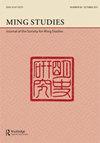Public Discourse and Private Sentiment: Ritual Controversies, Ritual Authority, and Political Succession in Ming and Chosŏn
IF 0.3
0 ASIAN STUDIES
引用次数: 1
Abstract
In this article I explore the issue of ritual authority in the Ming and Chosŏn through a comparison of the Great Rites Controversy and the Injo Rites Dispute which occurred a century later. I argue that Ming Taizu created an alternative source of ritual authority predicated on natural emotions through his changing of the national mourning code. By utilizing this source of ritual authority, Shizong and his allies undermined the ritual authority of the classical texts and Neo-Confucian commentaries cited by their opponents and in doing so not only won the conflict but also increased the ritual authority of the emperor vis-à-vis the bureaucracy. In Chosŏn, on the other hand, both sides argued along Song Neo-Confucian lines and rejected Ming ritual authority. Nonetheless, the lack of an alternate source of ritual authority that King Injo could rely upon led him to turn to the Ming for support in a calculated political move to end the dispute in his favor.公共话语与私情:明清礼教之争、礼教权威与政治继承
本文通过对一个世纪后发生的“大礼之争”和“仁祖之争”的比较,探讨明代和Chosŏn的礼权问题。我认为,明太祖通过改变国丧法典,创造了一种基于自然情感的仪式权威的替代来源。通过利用这种仪式权威的来源,世宗和他的盟友破坏了他们的对手引用的古典文本和新儒家评论的仪式权威,这样做不仅赢得了冲突,而且增加了皇帝对-à-vis官僚机构的仪式权威。另一方面,在Chosŏn,双方都沿着宋新儒家的路线争论,拒绝明朝的礼制权威。尽管如此,由于缺乏可以依赖的仪式权威的替代来源,仁祖国王转向明朝寻求支持,这是一个经过深思熟虑的政治举动,以结束对他有利的争端。
本文章由计算机程序翻译,如有差异,请以英文原文为准。
求助全文
约1分钟内获得全文
求助全文

 求助内容:
求助内容: 应助结果提醒方式:
应助结果提醒方式:


